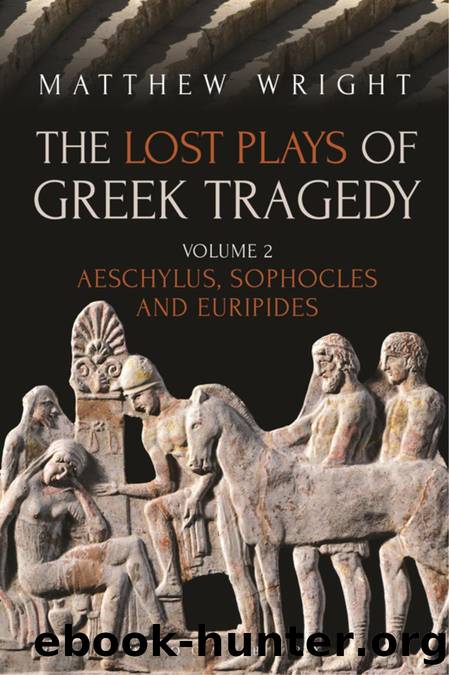The Lost Plays of Greek Tragedy (Volume 2) by Wright Matthew;

Author:Wright, Matthew;
Language: eng
Format: epub
Publisher: Bloomsbury Publishing Plc
Published: 2019-11-23T16:00:00+00:00
Danae (TrGF 5 F316-330a)
A tragedy about the circumstances leading to the birth of Perseus, after his mother, Danae, was raped by Zeus in the form of a shower of gold. This myth was also the subject of plays by Aeschylus (Polydectes and the satyr-play Net-fishers) and Sophocles (Acrisius, Danae and Men of Larissa).92
All the fragments of Euripides’ Danae are gnomic and reveal nothing about the plot, though it is notable that they all cluster around just a few subjects – love and marriage, children and money – reflecting the play’s themes. An additional fragment, purporting to be the beginning of the prologue, is preserved in a fourteenth-century manuscript along with several complete Euripidean plays.93 This is clearly a fake, dated by Martin West and others to the fifth or sixth century CE, and even though it may in some respects derive from the genuine Danae (via intermediary sources such as Lucian), it adds nothing of value to our knowledge of the play or the myth.94
The lexicographer Pollux reports that Danae contained a choral ode resembling the parabasis in a comedy, in which the chorus ‘steps aside’ from its normal role and addresses the audience in the persona of the poet himself:
Comedians naturally do this sort of thing, but it is not tragic. Nevertheless, Euripides has done it in many plays: in his Danae, for instance, he wrote an ode for the chorus (of women) to step aside and sing on behalf of himself, but he accidentally made them speak in a masculine fashion, forgetting that they were women. Sophocles also does the same sort of thing occasionally when he is trying to emulate Euripides, as in his Hipponous.95
Modern scholars mostly agree that tragedy, unlike comedy, never breaks the ‘fourth wall’, and so it is normally assumed that Pollux was mistaken.96 Certainly the tendency to read passages from drama in a naïvely literal or autobiographical fashion is widespread among ancient writers. Perhaps Pollux, or his source, noticed a grammatically masculine form in a choral ode performed by women and invented an explanation.97 Nevertheless, we should not automatically dismiss this evidence. We need to remember that all our views about normative generic rules and conventions are based on the extant plays. If a lost play seems to have behaved differently from normal, it need not necessarily be seen as breaking the rules: we ought to be more flexible and open-minded when considering what tragedy could or could not accommodate. It is hard to believe that Euripides or any other tragedian would have included a parabasis as such, but it is possible to imagine a less overt version of such a technique whereby some form of self-conscious authorial comment was more subtly conveyed. Indeed, it has been shown that Euripidean tragedy does contain many features which are implicitly metatheatrical or metapoetic, even though the dramatic illusion is maintained.98 Without the full text of Danae before us we can only speculate as to what sort of effect was intended. But it is clear that the choral lyrics in this play were unusual and that they ‘stood out’ in some way.
Download
This site does not store any files on its server. We only index and link to content provided by other sites. Please contact the content providers to delete copyright contents if any and email us, we'll remove relevant links or contents immediately.
| Ancient & Classical | Anthologies |
| British & Irish | Children's |
| Comedy | LGBT |
| Medieval | Regional & Cultural |
| Religious & Liturgical | Shakespeare |
| Tragedy | United States |
| Women Authors |
Cecilia; Or, Memoirs of an Heiress — Volume 3 by Fanny Burney(31594)
Cecilia; Or, Memoirs of an Heiress — Volume 2 by Fanny Burney(31557)
Dialogue by Robert McKee(4221)
The 101 Dalmatians by Dodie Smith(3374)
Bound by Hatred (The Singham Bloodlines Book 2) by MV Kasi(2962)
Harry Potter and the Cursed Child - Parts One and Two by John Tiffany(2939)
The Art of Dramatic Writing: Its Basis in the Creative Interpretation of Human Motives by Egri Lajos(2896)
The Beautiful Boys: A High School NA Reverse Harem Paranormal Bully Romance (Shadowlight Academy Book 1) by Gow Kailin(2746)
Angels in America by Tony Kushner(2413)
Carrie's War by Nina Bawden(2370)
A Clockwork Orange by Anthony Burgess(2344)
Unlaced by Jaci Burton & Jasmine Haynes & Joey W. Hill & Denise Rossetti(2268)
The Femme Playlist & I Cannot Lie to the Stars That Made Me by Catherine Hernandez(2186)
Drama by John Lithgow(2139)
Open Book by Jessica Simpson(2139)
Outside Woman (BWWM Amish Romance) by Stacy-Deanne(1983)
Terrorist Cop by Mordecai Dzikansky & ROBERT SLATER(1983)
Yerma by Federico García Lorca(1950)
Leo's Desire by Sundari Venkatraman(1827)
